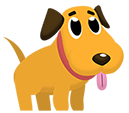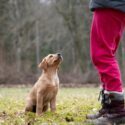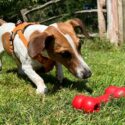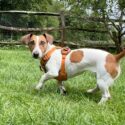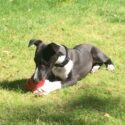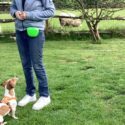We used to talk about the commands we use in dog training. Nowadays you’ll more often hear them referred to a cues. A cue is a trigger or prompt for the behavior your dog performs when it hears (or sees) the cue. Often the cue is a word, like SIT. Sometimes it’s a whistle or …
Time Out – Does It Work, And Will It Change My Dog’s Behavior?
Something that comes up from time to time in our training support group, and on our Facebook page, is the concept of time out. So I wanted to talk a bit about that today. About what time out actually looks like, from your point of view and from the dog’s point of view. At first …
Time Out – Does It Work, And Will It Change My Dog’s Behavior?Read More
4 Things That Need To Happen For Your Dog To Get Trained
So many people fail at dog training because they have no real understanding of what motivates their dog, or of how to include that motivation into their daily lives. The truth is, dog training is both easier and harder than you think. Easier, because once you have nailed down the four key principles that underpin …
4 Things That Need To Happen For Your Dog To Get TrainedRead More
When Can I Stop Using Treats In Dog Training?
Some of you are asking when you can fade training treats, or stop using them altogether. And I’m going to give you the lowdown on that below. But first, we need to talk. And we need to talk about extinction. I don’t mean dinosaur style. I mean extinction in behavioral terms. I’ve realised I don’t …
Your Whining Dog – Is There A Cure?
I won’t lie to you, I’ve hesitated, procrastinated even, for quite a while before beginning this article. Not because it isn’t needed. On the contrary, it is very common for our students, and Facebook group members, to ask us how to stop a dog whining. So why do I hesitate to tackle this topic? One …
How To Manage Leash Pulling In A Part Trained Dog
A reader asked me recently, how to manage their young spaniel when they need to keep them safe on a leash, but have not yet completed their leash training. My reader rightly recognized that walking the puppy on a leash while they are pulling ahead allows the puppy to practice the unwanted behavior which is …
Puppy Discipline And The Power Of Yes
It’s common to see new puppy parents advised to teach their puppy the word NO from an early stage. As a starting point for obedience training. We don’t advise this. In fact we advise quite the opposite. We recommend you teach your puppy the word YES. And I’ll explain that in a moment. But why …
Measuring Your Dog’s Progress Can Be Very Motivating!
There’s a popular saying in business “you get what you measure” or “you are what you measure” . It’s a somewhat flawed premise, but it has its good points! The idea is to encourage people to track what is important to them, what really matters. In the belief that this helps improve results. Of course …
Measuring Your Dog’s Progress Can Be Very Motivating!Read More
Puppy Pattern Days: How To Set Up A Puppy Schedule
Having a young puppy is a lot like having a toddler. They’re cute, and funny. They give great cuddles! But they’re also destructive, demanding, poor at communicating their needs, loud, always hungry, and incredibly time consuming. Managing life with a puppy can feel very overwhelming at times. I have spent the last four years supporting …
How To Get Your Dog To Behave Nicely Around Other Animals
One of the biggest mistakes I see people make with young dogs is allowing the dog to focus on a distraction. This is especially common when dog owners are trying to get their dog used to other animals. Whether it’s cats, sheep, rabbits, other dogs, the principles are the same. The more the dog focuses …
How To Get Your Dog To Behave Nicely Around Other AnimalsRead More
